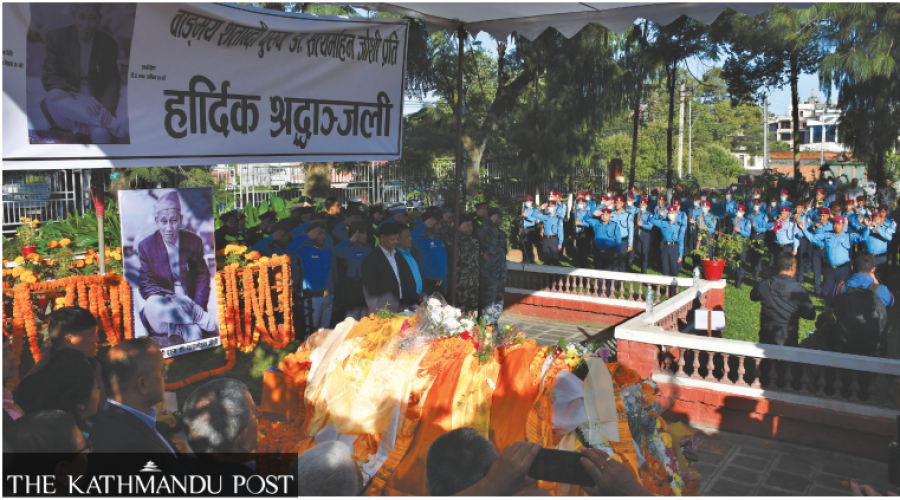National
Veteran cultural historian and polymath Satya Mohan Joshi passes away at 103
Joshi is celebrated for his achievements across literature, history, and culture with more than 60 books to his name.
Anup Ojha & Samuel Chhetri
Veteran litterateur and cultural historian Satya Mohan Joshi passed away on Sunday.
He was 103.
According to Suraj Bajracharya, director at KIST Medical College and Teaching Hospital, Joshi breathed his last at 7:09 am on Sunday.
The centenarian was undergoing treatment for prostate and heart-related ailments since September 23 and was shifted to the intensive care unit on October 10 when his condition did not improve.
During a brief phone conversation with the Post on Sunday morning, Anu Raj Joshi, Satya Mohan's son who was taking care of him at the hospital, said that since his father had donated his body, the family was in a dilemma on what to do with it.
However, during the day it was announced that Joshi’s body would be handed over to the hospital for research as per the earlier agreement.
Last year, the Joshi couple signed an agreement with the hospital to donate their bodies to the hospital for research after their deaths.
“This was a new scenario because we have never experienced it, but after broad consultations, we have decided to hand over his body to KIST Hospital for research as per his wish,” said Anu Raj.
As per hospital sources, Joshi’s health deteriorated from Friday. He was being administered oxygen from Thursday and his heart rate was also unstable. Joshi was also suffering from urine infection and pneumonia and a recent blood test showed he also has dengue.
For a long time, Joshi had been suffering from prostate and heart conditions. He was hospitalised multiple times previously.
Earlier, on April 14, he was admitted to the hospital after he experienced chest pains and problems in urinating. He was discharged after staying in the hospital for four days.
And in mid-June, he spent 10 days at the hospital.
Lalitpur Metropolitan City’s mayor Chiri Babu Maharjan, who reached the hospital following the news, said Joshi’s demise is a loss of a living history. “He was a guardian for all of us,” Maharjan said. “His life and contribution will be remembered forever.”
Joshi’s mortal remains were kept at the premises of Lalitpur Metropolitan City where hundreds of people from diverse backgrounds including cultural conservationists, literature lovers, art enthusiasts, teachers and students paid their tribute to the late historian.
“We had brought Joshi’s body at 12 pm and kept it in the metropolitan office premises till 4pm, and again we handed the dead body to the hospital,” said Maharjan.
Maharjan pointed out that he was one of the witnesses when Joshi and his wife made an agreement to give their bodies for research.
Joshi, who was born in 1919 in Patan, is celebrated for his achievements in the fields of literature, history, and culture with more than 60 books on music, drama, culture, and history to his name.
A three-time recipient of the prestigious Madan Puraskar, Joshi had also been honoured with the title of “Litterateur of the century”.
From founding the Rashtriya Nach Ghar to publishing books like The Coinage of Nepal, Karnali ko Lok Sanskriti, Mrityu Ek Prasna and Maharshi Yagyabalkya, Joshi’s knowledge about the cultural diversity of Nepal was profound, with many experts in the field of social science calling him as a virtuoso in the field of history and culture.
In March this year, unveiling a book ‘Satya Mohan’, written by journalist Girish Giri, Joshi had said that he did not know himself better and the book written by Giri helped. When inquired about his longevity of life, he would say it was the matter of ‘refraining from negativity’.
“He was a man who always devoted himself to his work,” said Giri, who during the latter years of Joshi’s life worked closely with him. “I take him as a person who truly loved this nation.”
Giri’s 308-page biography is an account of the historian's life, his work to preserve Nepal’s culture, and arts and details of socio-cultural change from the time of the Rana regime to the current global pandemic.
Upon Joshi’s request, a team of Paubha artists undertook the project to make an art of ‘Chakrasamvara’ that would be representative of “Nepal’s indigenous art traditions, practices, and methods”. The project is still underway.
In 2019, Lalitpur Metropolitan City hosted his 100th birthday celebration.
During the event, the historian had given tips for the public to live a longer life stating that one needs to eat well to live well. He had also disclosed that he would take a peg of alcohol before he went to bed. “Alcohol is very important for energy but one should not over-consume it,” he had said.
On Sunday, Prime Minister Sher Bahadur Deuba paid tribute to Joshi by draping the national flag over his body at LMC premises.
Likewise, CPN (Maoist Centre) Chairman Pushpa Kamal Dahal also offered final tributes to Joshi.
Joshi was also paid tribute with state honours. A contingent of Nepal Police offered a condolence salute to Joshi at the metropolitan office premises at 4 pm on Sunday before his body was taken to the hospital.




 11.51°C Kathmandu
11.51°C Kathmandu.jpg)
















